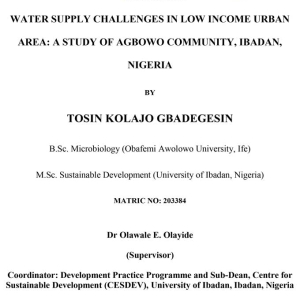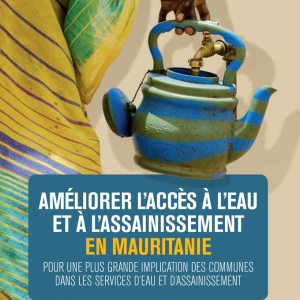Description
Performance and prospects of rural drinking water services in francophone West Africa
This study looks at the evolution of rural water supply policies in francophone West Africa and the performance of the delegation of rural water services. Since the 1980s, rural water services have been predominantly managed by community-based organisations, partly due to a decrease in the State budgetaryand human resources caused by structural adjustment programmes. In parallel, many countries have followed a decentralisation process and transferred the responsibility for rural water services provision to the local level.
The six countries reviewed in this study (Benin, Burkina Faso, Mali, Mauritania, Niger and Senegal) were selected given their long experience with the delegation of rural water services at the local level, some of them since the 1990s; and recent reforms in some of these countries in the rural water sector towards recentralisation of rural water authorities and delegation of rural water services at a much wider regional scale (e.g. Mauritania, Senegal and Benin). While these efforts are pioneering in terms of reforming and clarifying the institutional framework, they are also indicative of attempts by the State to “take back control” to some extent from local actors. There is a tension between such reforms and broader decentralisation processes, which are often incomplete: in countries where rural water services delivery is decentralised, municipalities
often lack the financial and human resources to carry out their mandate. The drivers for reform are varied, but include:
The evolution of rural water infrastructure, in quantity and quality, and the hybridisation of rural and urban water infrastructure, especially in small towns and rural growth centres;
• The influence of donors, especially the World Bank and the French Development Agency (AFD);
• Water resource concerns;
• The influence of parallel reforms in the urban water sector;
• Political leadership, regional alignment and competition between countries.
• Equity concerns and policy ambition to harmonise rural and urban water tariffs.
The delegation of water services in rural areas is not a panacea, or claiming to be the sole alternative to community-based management. In many countries there is a gap between theory and practice, with alternative models for rural water services delivery co-existing with informal arrangements, where services should have been delegated. The focus of such reforms has been on piped water systems, with point sources such as handpumps left out of ambitious rural water reform plans. However, in many of the West African countries under review, point sources still serve the majority of the rural population, and will continue to remain essential for some time.
Increased efficiencies and better performance of service provision are a key factor for motivating these reforms, as overall financing for the rural water sector remains limited in volume and efficiency. To improve the financial viability of rural water services, West African countries have experimented with
clustering / aggregating / consolidating infrastructure to delegate rural water services at the scale of several municipalities, a district or a region, including through contracts to regroup several local authorities, such as (i) Design, Build and Operate contracts (DBO), (ii) regional delegation of rural water services, and (iii) intermunicipal arrangements.
Rural water tariffs in the region are often below cost-recovery levels, although much higher than urban water tariffs (which are often subsidised). Subsidies for rural water mostly target the construction of new infrastructure or major repairs rather than operation and maintenance costs. In contrast, Mauritania may be
one of the few examples where the State is planning to provide subsidies for rural water services delivery.
The fact that many West African countries have a vibrant market of rural water operators, public and private, local and international, is positive. Supporting services providers is key to ensuring the sustainability of rural water services, yet rural water operators often receive limited support by the State. In West Africa, this is done by (i) providing technical assistance at decentralised level to local operators, and to service authorities, to allow them to grow into their role and/or (ii) aggregating or re-centralising to bring in professional operators to accelerate the development of the rural water sector. However, experiences are mixed: in Senegal, some felt that the ongoing regionalisation reform has “dispossessed the country of local capacity” by replacing local water user associations with international consortia for service delivery. Others argue that this reform can improve rural water services delivery and build the capacity of local actors From the perspective of the operators, there are several risks – additional to commercial risk – which often compound the inherent difficulties of rural water services provision under delegation contracts. They include: (i) a weak institutional framework, which may lead to poor enforcement of delegation contracts;
(ii) the lack of technical and financial capacity of local authorities, when they are the service authority (iii) the lack of social acceptability by communities if reforms do not lead to the results announced by service authorities, which can translate into low use of water services, refusal to pay, social tensions, degradation
and vandalism of rural water infrastructure. In addition, contextual factors including water resources issues (quality and quantity) climate change, population growth, and broader security, State fragility, and
governance issues are at the forefront of water services providers’ and policy-makers’ concerns.
The lack of regulation, data and monitoring was highlighted as an issue hampering progress and sustainability of rural water services in West Africa. The question of the scope of rural water regulation and where to anchor it (at the national and/or local level) is also evolving in many of the countries under review.
In all contexts, operators and authorities need to be accompanied and equipped to report to the regulating authority (if it exists), water users, and the State.
West African countries have the ambition to achieve SDG6.1 and to advance to higher levels of service in rural areas. However, there is a tension between two schools of thoughts aiming at professionalising rural water services: one which advocates for decentralisation and supporting local authorities in their mandate; and another which seeks to re-centralise (in part or completely) service authorities, which enables delegation of services at a wider scale. This is a debate which is playing out not only in some of the countries reviewed in this study, but also others in the region (including Côte d’Ivoire, Cameroon, and Togo).
While no unique solution seems either plausible or pragmatic for all countries in West Africa, clearer evidence of what works and why is central to determining future policy and investments. This study identifies some of the key questions in this ongoing debate, which necessitate further reflection:
• Will the move to re-centralise rural water service authorities improve financing, performance
monitoring and asset management?
• Where decentralisation is ongoing, what will the role of local stakeholders (including local government)
be in countries that have recently re-centralised the rural water sector? Will they be able to hold service
authorities and operators accountable?
• In contexts where it has been decided not to subsidise rural water tariffs, how should water services
delivery be funded sustainably while ensuring equity between rural and urban residents?
• Will regulation evolve to ensure the sustainability of rural water services under delegation?
• In contexts where international expertise is needed to deliver universal rural water services in the short-term, how will local capacity be developed to ensure the sustainability of rural water services in the long-term?






 AAEA
AAEA AAEA
AAEA
Reviews
There are no reviews yet.